We spent the week working on several writing projects. First, we continued with final revisions on our creative stories. We also worked in small groups to build a detailed script, with dialogue and set notes, for our extravaganza play. Thirdly, we worked on researching important information for our survival guide brochures. The students are working on summarizing relevant information they find from reliable sources and providing brief citations along the way.
We spent the week wrapping up our unit on creative writing. The epic creative stories have been revised polished and finely tuned! I have been so impressed by students’ attention to detail as they read over their peers' work as well as their own.
Students will be defending an opinion or position on a topic through a short debate next week. This week, we began to explore the idea of debating (vs. arguing) a position through a fun game in which students stood in a particular part of the room to show whether they agreed or disagreed with various statements. A number of interesting conversations sprung up as we realized that the opinions within the class are quite diverse. We talked about the difference between arguing and debating, and the importance of information to back up your statement.
We continued to edit our creative stories with the help of peer feedback. We are challenging ourselves to bring our storylines to a close next week so that we can focus on revising and perfecting what we have already done.
Our grammar practice linked to local natural resources, including our local watershed, and source of electricity. Caught Ya continues to be a great method of reinforcing conventions of writing while deepening our learning during this project.
Word work this week focused on...
-ambiguous vowels
-final syllables (-er, -ar, -or) patterns
-roots: arch, princ, pop, pub
We finished a rough draft of our creative stories! It has been great to see students taking initiative to work on their writing at home with the help of Google Drive. I have been impressed by the way the Toros have used great "hooks" to engage their reader with the first sentence or paragraph!
We began the week by debriefing the our molecular gastronomy project and writing thoughtful reflections on the process. Students were asked to reflect on their greatest successes, greatest challenges, and things they would do differently next time. We also wrote thank you letters to the judges who participated in the filming of "Chemistry Countdown". The writing we did this week offered a great opportunity to practice adjusting our writing technique and "voice" based on the audience.
We also jumped back into our weekly spelling practice, or "Word Work" with new words and a focus on the meaning of our new words. Our goal is to build our vocabulary and improve our spelling skills by focusing on spelling patterns and word roots.
We are delving back into the creative writing process! Students are using an outline and graphic organizer to orient themselves as they complete a rough draft of a story. Many of our plots center on amazing adventures, some of them interplanetary!
We continue to set aside some time during the week for independent reading and book discussions.
Despite a week full of cooking craziness, we found time to perfect our scripts. The students worked hard to link brief biographies, informational writing, engaging and dramatic transitions, and even a few hilarious commercials! Students also reflected on their project experience. They summarized their greatest challenges, triumphs and things they would do differently next time.
We continue to link our grammar practice to our project and world history. This week, we mapped the key ingredients of garlic bread, a class favorite. Already, a number of patterns have emerged as we look at the connections between food and human history. The origin of many of our favorite cultivated crops can be traced to ancient Mesopotamian civilization, the location of the first cities supported by surrounding agriculture.
We made time for a few fun creative writing prompts and worked on detailing our scripts, judge bios, and chemistry explanations surrounded our unique recipes. We also had the chance to meet in small groups for reading discussions. Despite a short week, we worked on new spelling words and patterns. The students have developed creative board games and clever comic strips to employ the words they are focusing on.
We delved deeper into script writing- there are so many details to plan for in our cooking shows! The episode groups are getting organized and finishing important work before we film in the coming weeks. We also made time to build our writing skills through short, creative writing prompts. One morning in Writers Workshop, each student was prompted to create a newspaper article that included the following words: toothpaste, cantaloupe, flip-flops, flashlight, and guitar. The stories were all so unique! One story was an article about a mysterious crime scene. Another was a press release for a new and unique toothhpaste. Yet another was a travel article about a new and luxurious hotel. It is so fun to work with these creative thinkers and writers!
We also met with our Reading Buddies in Pre-K this week. We found story books that featured snow and water to tie in with the Pre-K students' new project topic. The Toros set such a great example during reading buddies! Their love of reading shines every time they sit down to read a book with a young student.
The students sent off interview questions to the judges who had already agreed to participate in our cooking competition. It was a great opportunity for the students to think about how to develop a professional voice so essential to a more formal letter or email. Since most of the students are still waiting to hear back from those judges, we had time to devote to creative writing.
The students were really excited to continue to build their creative stories! We laid the ground work by "mapping" main characters, drawing an action picture from the evolving plot, and creating a well-connected outline with the help of a graphic organizer. After creating each of these components, the students were ready to jump into writing their rough draft. It was great to see students referring back to the work they had already done as a way to navigate through the writing process. i can't wait to read their finished stories!
This week, we augmented our weekly word work and project-related writing with building on our creative writing. We were inspired by the workshop given this week by Ken Thomasma, author of Naya Nuki. He is an amazing story-teller who shared with us his inspiration for writing Naya Nuki: an amazing Native American Girl. He said he just had to share her story! The Toros went on to create detailed character maps to identify the essential traits of their protaganist. We also drew "Plot Shots", detailed sketched of a key moment in the story. Next week, the Toros will work backwards and forwards from these pictures to outline the full story.
We also continue to write in various ways to support our project work. We are writing scientific explanations of the chemistry of the recipes each student is choosing for the cooking show. We also are learning a valuable skill: composing emails with a professional voice. Each student is responsible for interviewing and writing a brief biography about one of our cooking show judges.
On Friday, we were able to reconnect with our reading buddies in Pre-K! The Toros chose fun storybooks to share with their reading buddies. The Pre-K students LOVE reading with the Toros. The Toros did a great job of modeling how to dive into a great book as an active reader. See great photos in this week's slideshow!
We focused our Readers Workshop this week on discussing the ways our book club books have impacted our perspectives on food, cooking and chemistry. We formed small groups that were able to share about different books linked to our project. Students who had read The Omnivore's Dilemma shared that the book changed how they thought about food. Sammy mentioned that the book conveyed a disturbing picture of processed food; it changed her thoughts on foods she wanted to eat in her own diet. Readers who had read Charlie and the Chocolate Factory were influenced by the essential role that creativity played in the world built by Willy Wonka. Orion shared that Willy Wonka was able to make ordinary ingredients exciting! Students who read A Gebra Called Al were pulled more into the world of math and chemistry. The novel inspired Emma to think about Math in a different way. She was inspired by the use of symbols to better understand and teach math and science. All three of these books have informed our thinking as we continue with our amazing project!
We continue to practice grammar skills through a short "Caught Ya" exercise several times per week. We are beginning to use interesting and relevant National Geographic articles as a source of cool content. "Caught Ya" continues to be a great way to reinforce important grammar skills in the context of wold geography, current events and culture.
On Monday, we delved further into formatting and outlining our script for "Chemistry Countdown". There will be three episodes, each featuring three different chefs. For the rest of the week, we used a "Restaurant Booklet" notebook to capture of thoughts, reflections and creative thinking as we took on the challenge of designing a restaurant! We all came up with amazing plans, some of which tied into our cooking show contestant alter egos.
We wrapped up revisions of our Chef Bios this week! We spent time revising the work of our peers. I also gave feedback to each student. It was a great way to put our "Caught Ya" grammar work into practice. Apostrophes, commas, and periods, oh my!
We worked on learning new spelling words this week. The word work we do goes beyond the simple memorization of certain words. The students are exploring important spelling patterns that they can apply to many other words as they continue as readers and writers. I am proud to report that everyone who took the quiz on Friday got 100%! Go Toros!
We have wrapped up our chef biographies, begun last week. These will be incorporated into our cooking show as the chef contestants are introduced at the beginning of the show. We are working on editing these pieces of writing for clarity and flow while incorporating great details about our alter-egos.
Each Working with Words group studied new spelling patterns this week. The students are great at taking initiative to sort and practice the patterns. Friday, we played a few fun rounds of sparkle spelling and took our spelling quizzes before jumping on the bus!
The main focus of language arts this week was reviewing the format of a formal outline which we used to outline the format of our cooking show and writing the chef bios. Students began creating their fake chef identities that they will take on for the cooking show. Students were required to first write an outline of the elements of their chef biography using the same format we used to outline the cooking show format. They will then, next week, turn those outlines into the paragraphs that will be read by the host of the show during the chef bio segment.
This week we created 'postcards' for Natasha. This was a fun opportunity for students to review the principles and structure of stories. They constructed short stories about fictional events that took place during the week and then took pictures that summarized the stories and provided the front on the postcard.
Project Vocabulary
Language Arts this week consisted of working on writing questions and defining vocabulary to help us out with our molecular gastronomy project. Students wrote versions of the driving question in their writer's notebook to help the class come up with the final driving question for the project. This exercise provided an excellent opportunity to talk about how different question words - can, why, how - provoke different answers and different thought processes.
Students words this week for spelling focused on vocabulary for our project. Not only do some of the words present challenging spelling patterns, but students will also have to understand the definitions of the words.
Creative Writing
After begging for months, students were finally given the opportunity to start some creative stories this week. They were given a graphic organizer to help them plan out the plot, characters, and setting of their stories. For the next month or so, students will be given more time to work on these creative stories in a writer's workshop until it is time to write the scripts for the 'Chopped' episodes.
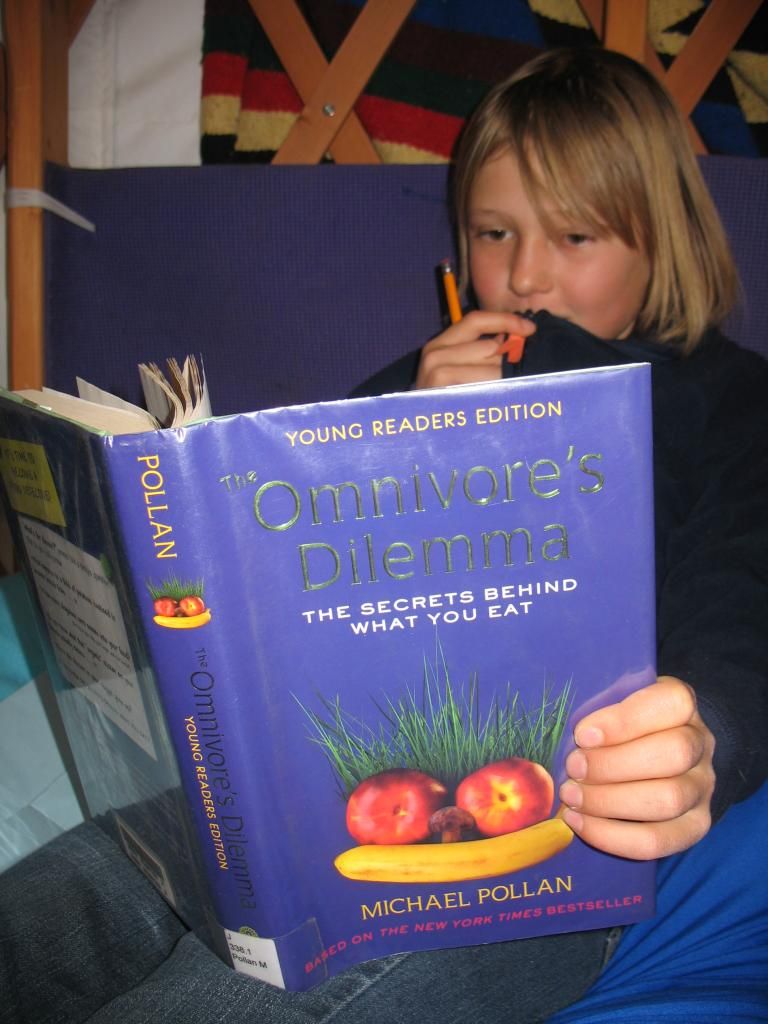
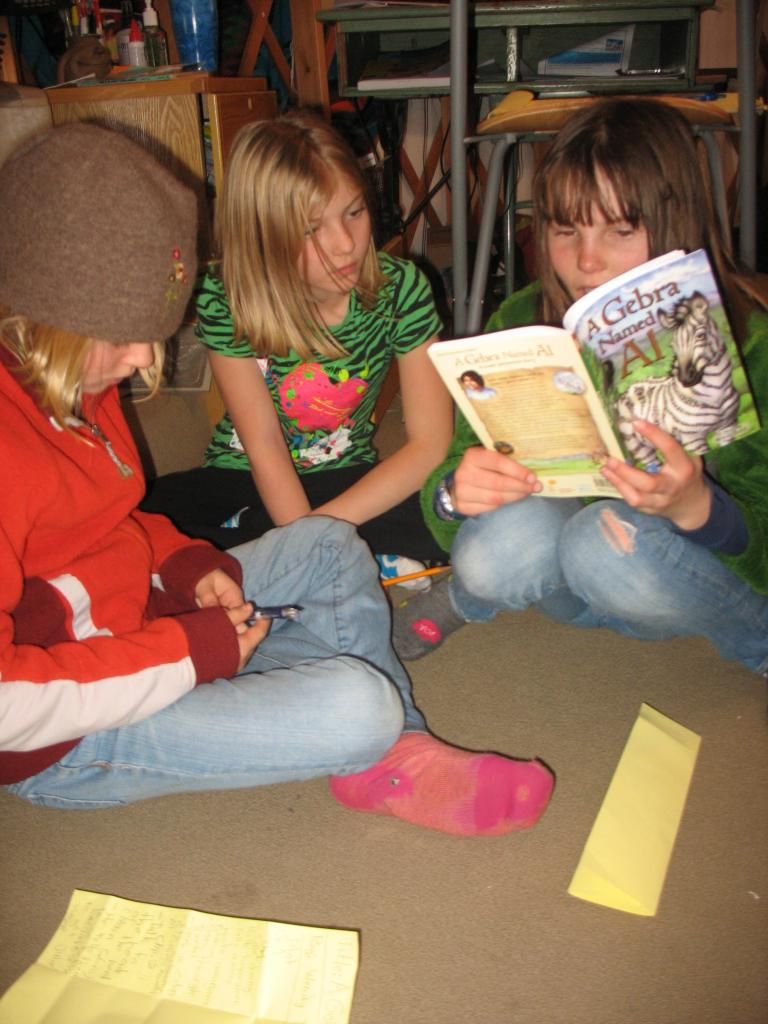
Book Clubs
This week we have been able to continue reading the books that are all thematically related to our molecular gastronomy project. We are reading books in book clubs - this means that students were given a selection of books relating to food or chemistry or both. Students were then grouped based on the book they decided to read. While students read their books, they stop to have discussions amongst their group and with the teacher. Students are also taking notes on bookmarks while reading. They are taking notes on the plot of book as well as certain themes that prevail in the books. Students are learning how to prove the existence of themes with quotes.
Here are some examples of the books students are reading and the notes they are taking that correspond to those themes:
The Omnivore's Dilemma by Michael Pollan
|
Plot Chapter 6 cow feed = manure, chicken, corn, chocolate, candy, cement, dust |
Theme = molecular gastronomy industrial digestion corn/acid |
Quotes "Corn...broken down...soaked in acid." (p. 65 |
Charlie and the Chocolate Factory by Roald Dahl
|
Plot Chapter 5 about the first two people that get golden tickets |
Theme = symbols Agustus Gloop = gluttony Veruca Salt = entitled |
Quotes "...only interested in eating." p. 27 |
A Gebra Named Al by Wendy Isdell
|
Plot Chapter 6 * Julie doing math homework * falls asleep * meets imaginary number and Gebra named Al |
Theme = allegory zebra = mathematical equation horses = elements cubed food = numbers |
Quotes "Yeah, you know, Lithium. A Periodic. As in the Alkali Metals?" p. 10 |
Writer's Notebook
We had a ton of fun in our Writer's notebooks this week learning about alliteration and practicing alliterative sentences. Here are some of our favorites:
Alabaster ants from Alabama allow Al an apple.
Dinosaurs dine on disasterous dynamite.
Bees buzz because Beth's breath is bad.
Writer's Notebooks
Writer's notebooks allow students to breath in the world around them. They create a place/space to:
discover strategies be creative have space to try out new things
record impressions...........observations...........and ideas. keep a record
learn about and practice with literary devices EXPLORE
This week we made a commitment to utilize and write in our writer's notebooks more. We began with some simple warm up exercises - write as many words as possible in 2 minutes that start with the letter E.... example, exercise, enter, eclipse, energy, energize, elephant, egg, eggplant, eat, eaten, ebb...
Then, we explored metaphores: What is a metaphore? What would some metaphores for the sun be? flaming orb, overwhelming glow from the sky, fire shooting through the sky.
Finally we landed on personification and wrote several great entries that personified animals:
 fluffy is the strong silent type. He rushes to your side always eager to help and save lives. He is an exercise freak and likes to stay in shape. Fluffy is often shy and gets nervous around strangers but always seems to be telling them, "Don't worry miss, I'm here to protect you."
fluffy is the strong silent type. He rushes to your side always eager to help and save lives. He is an exercise freak and likes to stay in shape. Fluffy is often shy and gets nervous around strangers but always seems to be telling them, "Don't worry miss, I'm here to protect you."
Finally, we personified our own pets:
Kevin the Turkey - by Owen Klausmann
Kevin is the boss of the chicken coop. He thinks that his gobble is so pure it can turn chickens into solid gold. When you walk by, he gobbles at you as if he were saying, 'Come clean my house you insolent peasant!' Sometimes I have to shown him who is boss so he doesn't start a rebellion to get gourmet cheesy corn instead of normal turkey kibble.
ONE .... ?
nope
TWO....?
nope
THREE, FOUR, FIVE!?
YES! That is how many times these awesome students had to edit the informational geologic and historic paragraphs for the Gaper Guide project. It was arduous, tedious, and possibly not even fun but they stuck to it and got the job done.
Students learned many great lessons about editing and writing along the way and there are many more to come. So when report cards come out next week, please don't get down on the fact that your child has not mastered all of the components of 5th or 6th grade writing after handing in the first big writing assignment. I can't wait to see what we create for our next project!
Working with Words
Due to our crazy schedule last week, not everyone got new words this week. With more time to work with their word patterns, however, the groups that did not get a new word list were given more difficult words to work with. Most of the words were words that students had to look up the definition of. They were then also tested on the definitions of the words rather than just the spelling of them.
Since students were also working with familiar words from last week, it allowed them to have more time to play games that involved their words. One group, invented a fabulous game akin to CandyLand.
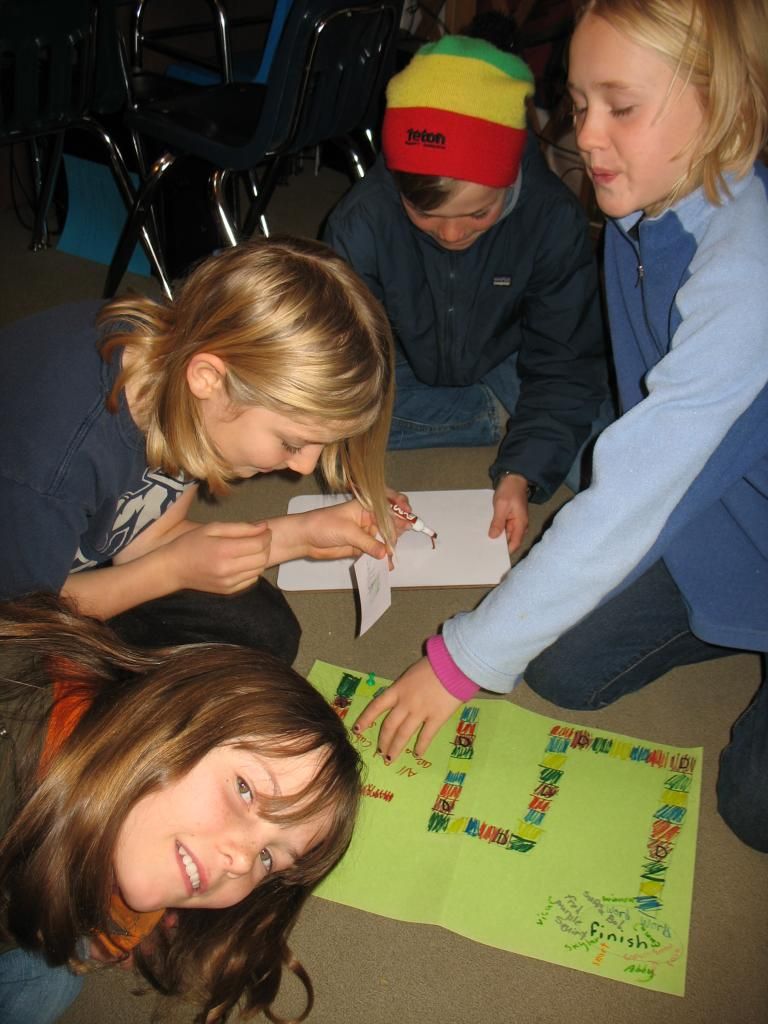
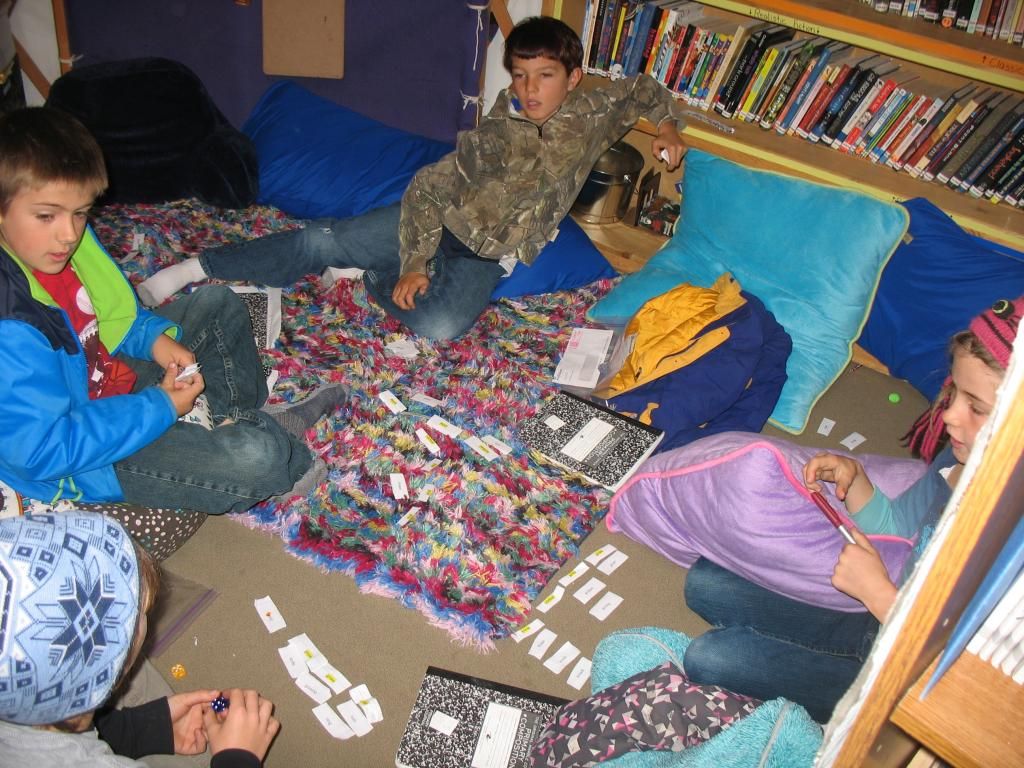
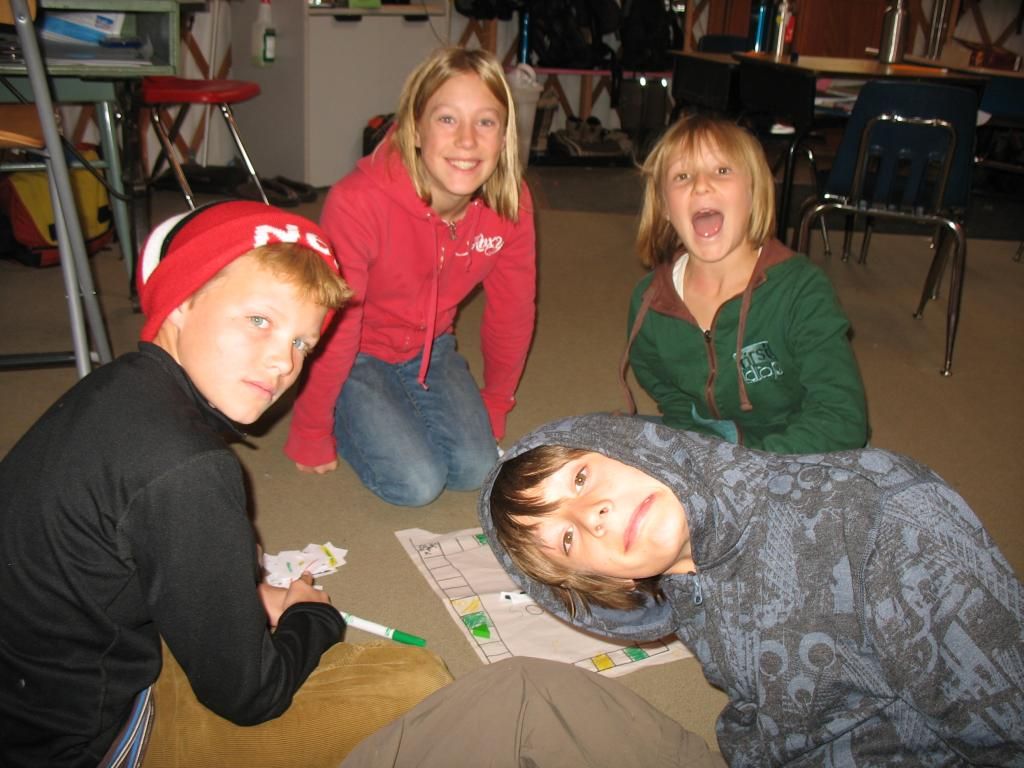
Writer's Workshop
This weekd the focus in our Writer's Workshop was on Topic Sentences and Concluding Sentences. Students read examples, learned how to use them, practiced with them, and played games with them all in an attempt to help them start writing these types of sentences on their own.
Below, students had to partner up the other student/s who had star ideas that matched their Topic or Concluding sentence.
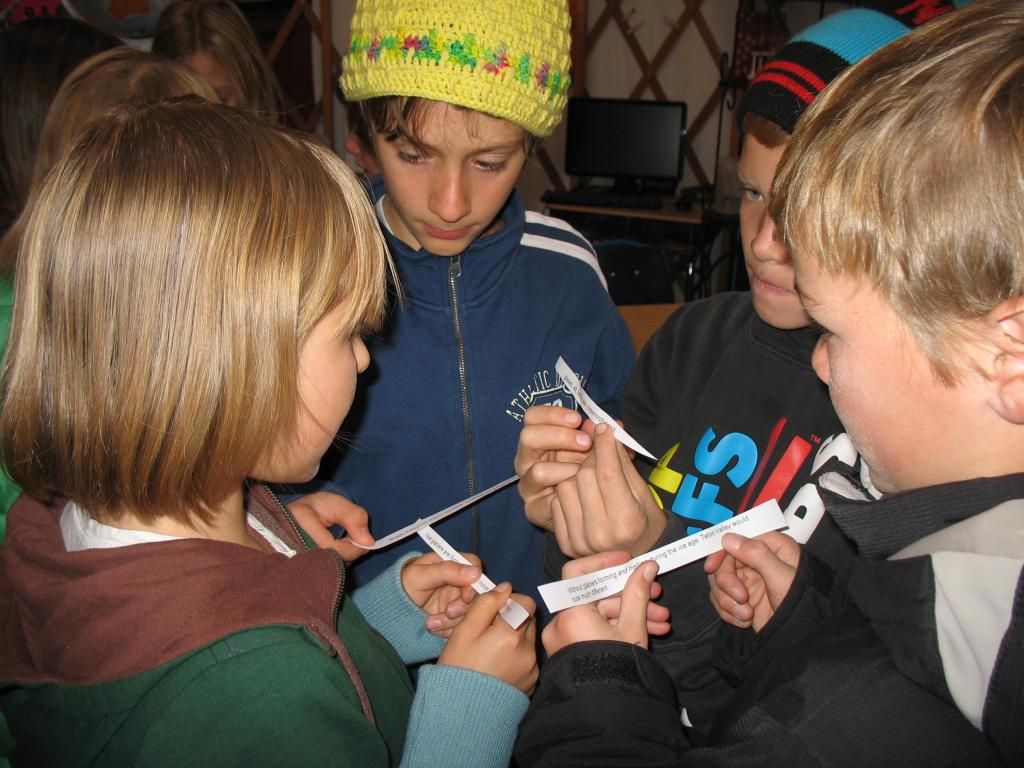
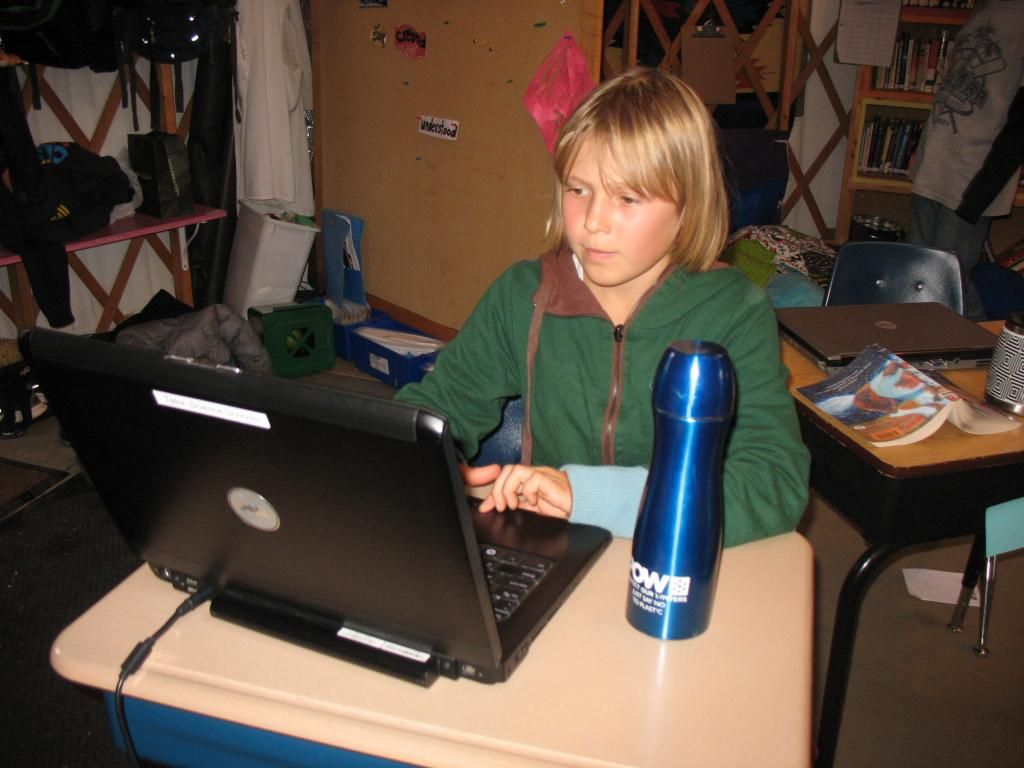
And of course we continued to edit our paragraphs!
We started off the week withe one of my favorite videos about peer editing. Check it out below! It reminds students of some of the do's and don'ts when editing classmate's paragraphs.
After watching the video, students switched papers, read their peer's paragraphs, and then help conferences to review the strengths and weaknesses of their peer's paragraphs.
With corrections from their peers and the teacher in hand, students then spent some time editing their paragraphs.
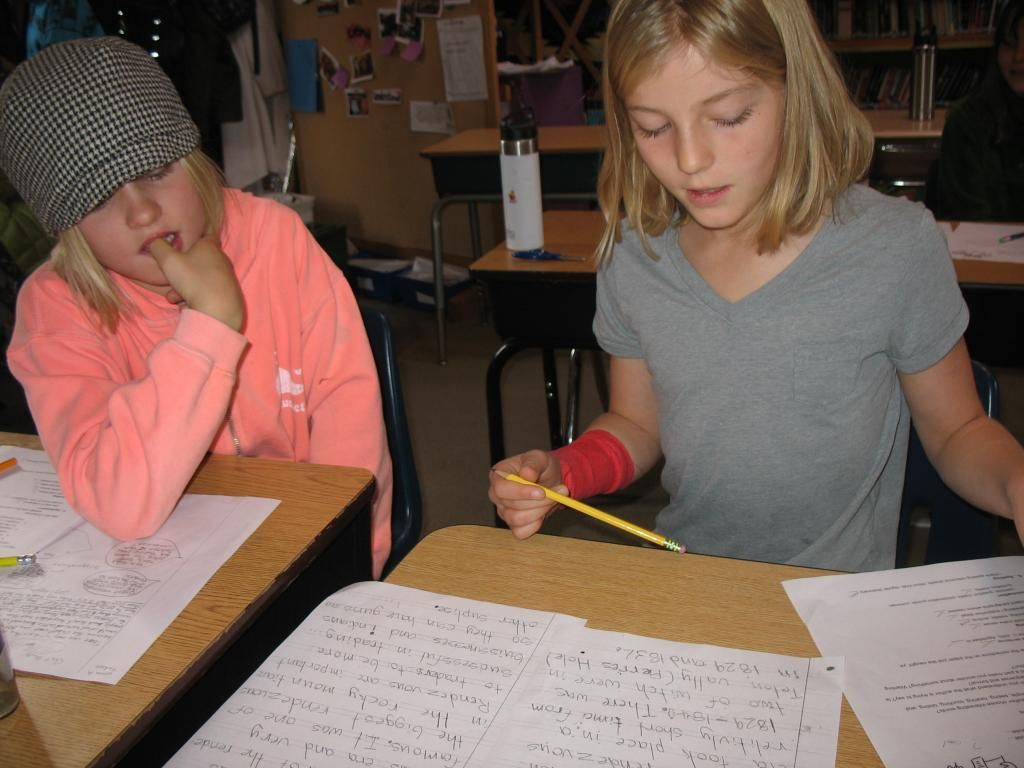
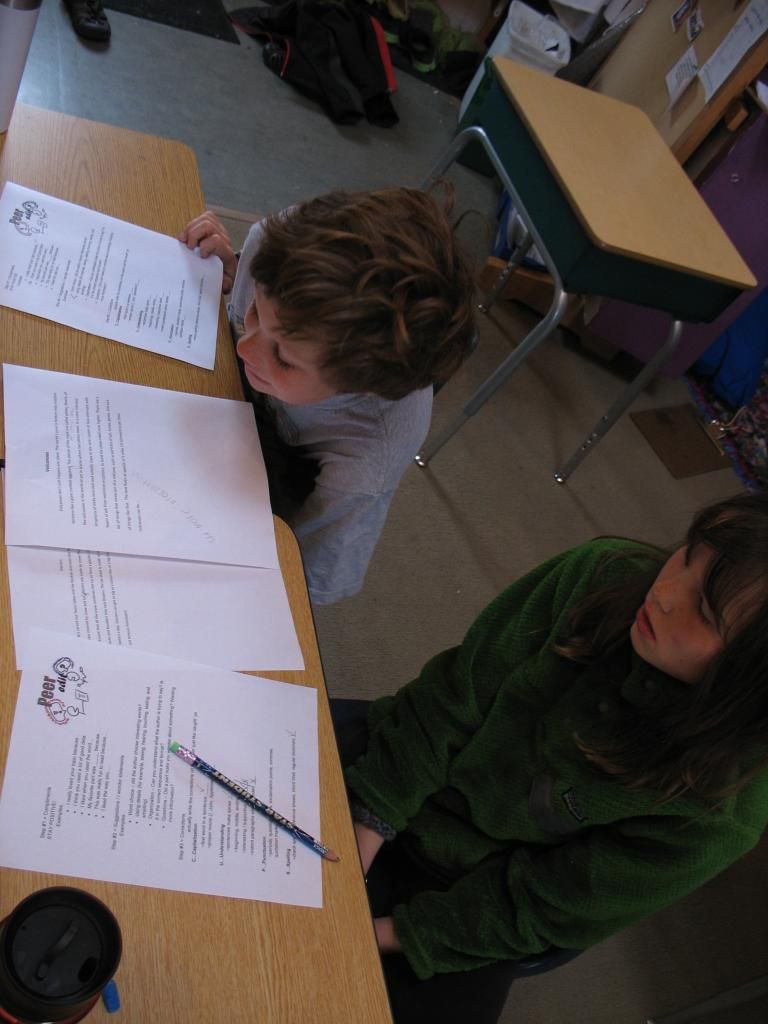
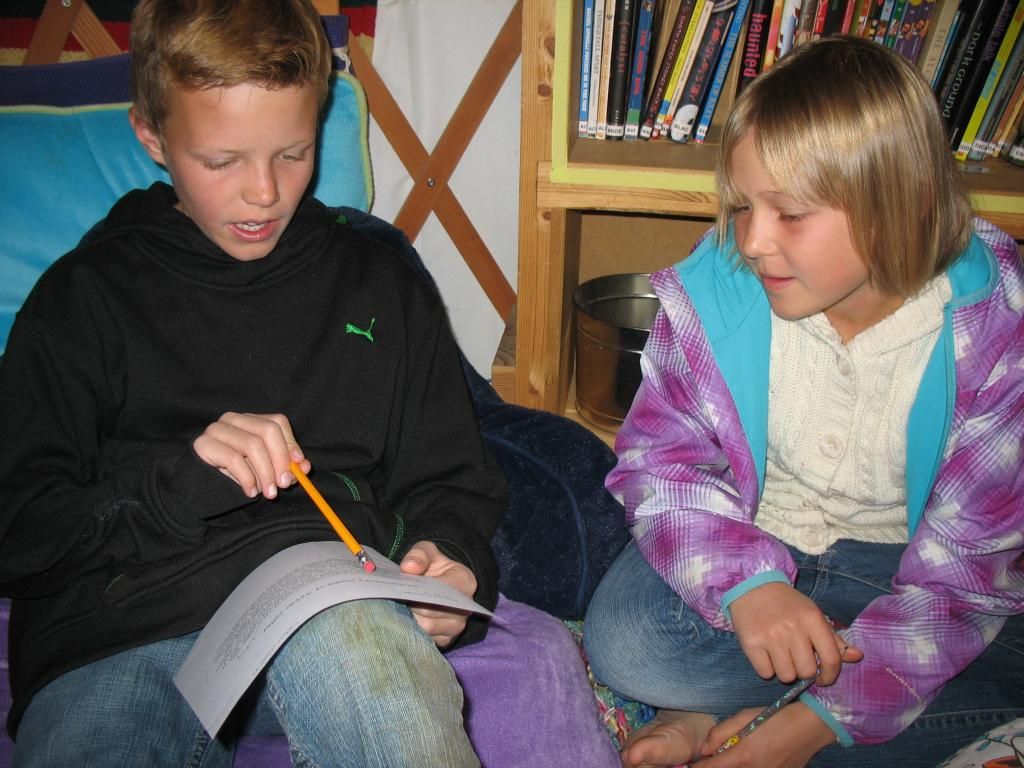
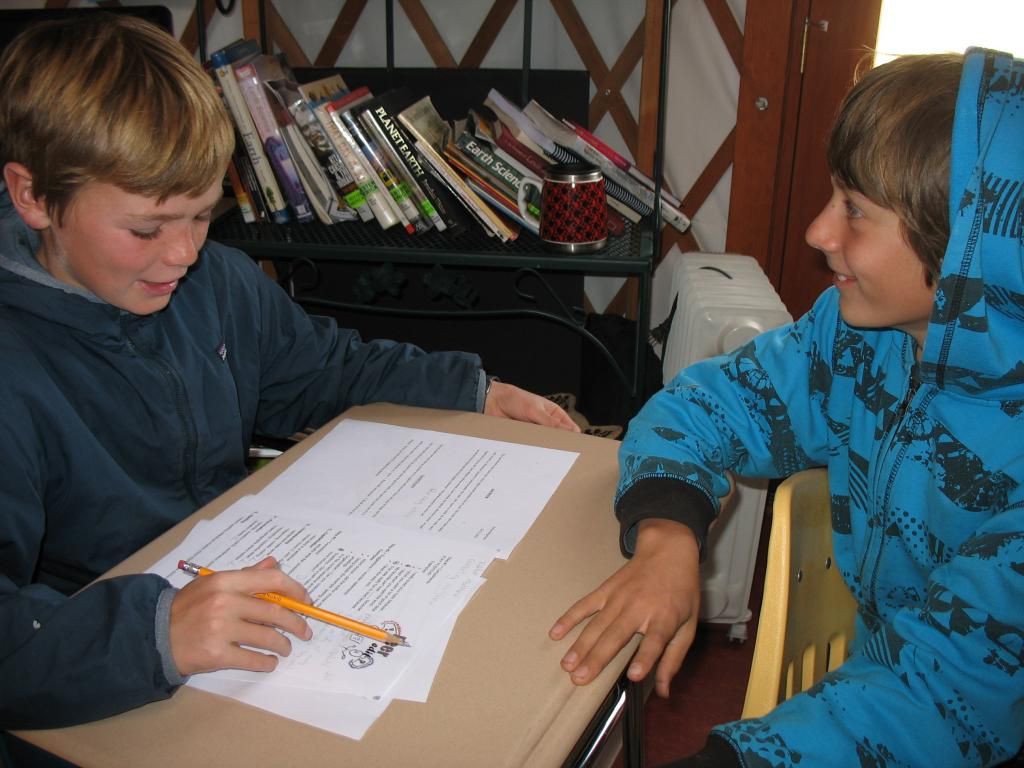
Students sat down and wrote this week. We also did several activities to hammer home the idea of the 'stop light' structure of an outline and an informational paragraph.
By the end of the week, everyone had at least one rough draft of a paragraph to hand in. Next week, we will finish up our rough drafts and students will peer edit each other's paragraphs. They will also give the rough drafts to the Tiger Wolves to begin work on the final product for the project.
Language Arts this week continues to focus on how to write a good informational outline and paragraph. We had a writer's workshop on Friday to review what a good 'stoplight' paragraph looks like. Students then practiced analyzing other informational paragraphs to decide which was written the best.
Caught 'ya
We continue to hunt down the Stradivarius Violin in our Where in the World Is Carmen Sandiego game. Students are learning about geographic coordinates and appositives as they correct sentences and use atlases to search for geographical information.
Our Working with Words continues to go well. Students are beginning to work with more difficult phonemes which means they might need more practice at home. Although I don't require students to study their words at home since we work with words every day for 30 minutes, I do ask that students bring their words home and share what they are learning about them that week with their parents. Parents - please ask your children what words they are working with this week and what pattern/s those words follow.

Two writer's workshops were the highlight of Language Arts this week. First we discussed how we actually use our research notecards to organize our the outlines for the informational paragraphs students are writing for the gaper guide project. Then, we talked about interviews and good questions. The 'question' workshop was meant to prepare students for Grandparents Day. As we roll into the historic part of our Gaper Guide project, students decided to take advantage of the experts (their grandparents) and their wealth of knowledge about the history of the United States. Students reviewed what a good question is, played a game to help them practice asking good questions, and then we wrote some terrific questions for the interviews that took place during Grandparents Day.
Writer's Workshop
As students finish their research for the Gaper Guide project, they will have to put the facts they have gleaned from their reading into a written composition. The writer's workshops this week introduced students to how to plan for and write and informational paragraph. For some students, it was the first time they were introduced to the concept of a 'stop light paragraph' and for others it was review. Either way, the workshop gave students an opportunity to think about how their sometimes disparate facts would fit together to uniformly explain their topic for the purpose of our project. Students began creating 'stop light' outlines to help with the planning process. The outlines should take time and consideration to create as students will follow them carefully when composing their paragraphs.
Reading and Writing
Last week and this week, students were asked to practice summarizing a book. We began with the basics of giving beginning, middle, and end plot summaries while listing main characters and settings. As we discussed the importance of taking notes while you read and how to do that, I demonstrated the tasks I asked students to do while reading Rocky Road Trip, a magic school bus book that is packed full of information about rocks, the rock cycles, and the structure of the earth. Unbeknownest to the students, this children's book was an important demonstration tool for skills students will be building throughout the year.
Language Arts always syncs well with the projects we are doing. Now, for example, students are reading books they self selected from a variety of genres, none of which have anything to do with our project. The skills of summarization, skimming for words, and critical thinking that I am asking them to apply to their personal reading books, are also quickly getting absorbed and reapplied to the much more difficult non-fiction books students are reading to complete research for their project.
Rocky Road Trip, is a fiction book based around a fun and funny story. It is packed, however, with non-fictional facts about rocks. While I read this book in class, I see students get absorbed into it in the same way they become absorbed in their personal reading books. When asked to apply the skills I demonstrate while I read out loud, students readily and easily comply. Unknowingly, they also begin to use the same skills for the non-fiction passages Rocky Road Trip and their project research.
Working With Words
In developmentally appropriate groups, students each worked with with spelling/vocabulary lists that were tailored to group and individual needs. Students had their first spelling tests this Friday. Every week, students will have a spelling test from the list of 15-20 words they have been working with throughout the week. Although they will only be tested on 6 of the words, those words will be unknown to the students until the time of the test. If students miss a word on their test, that word will be added to next week's test. Testing spelling in this way promotes the understanding of the spelling patterns students are working with rather than the memorization of individual words.
Writing
Students kicked off the week by making their writer's notebooks both in their homeroom and art classes. The writer's notebook is a place for students to express their thoughts, respond to brief writing prompts, and practice skills introduced in class. Although writer's notebooks will, for the most part, stay at school, we are hoping to start scanning student work into the computer and then share it with parents this year.
Our writer's workshop this week spun from the initial writing sample students wrote. For that sample, students were asked to write a short summary of a book they recently finished. After modeling how to take notes for a book summary during the teacher read, students practiced writing about the beginning, middle, end, characters, and setting of the books they are currently reading in class.
Reading
Throughout the year, students keep track of which books they have read on our reading board, just behind the weekly documentation board in the library of our yurt. At the moment, students are reading self selected fiction books that they will read silently during class. Students also began reading various non-fiction books as a part of the research they started on Friday for our new project. At the beginning of the year, students are given more time to research and read because they are asked to read the information books more thoroughly to find facts rather than rushing in and skimming for information (which is a fairly difficult skill). Students also took their first STAR reading assessment of the year.
Spelling/Vocabulary
It is surprising how complicated spelling assessments can be! It took us all week to wrap these up and figure out where students needed to start in terms of their orthographic studies. By Friday, however, students were able to look at and analyze their spelling tests and choose words, from a list of vocabulary relating to our project, that have spelling patterns they need to work on. Next week, students will have their first spelling test on Friday after they have a full week to work with their words and spelling patterns. Students will regularly have spelling tests every Friday from next week onward. Although students will have ample time to practice their words in class, they are highly encouraged to practice the words at home. The spelling words for the week will always be written in students' daily planners.
Grammar
On Friday we began a new an improved version of Caught 'Ya. Caught ya is a way to learn and practice grammar and mechanics through a practical, hands-on approach. This year, the story for our caught 'ya is coming from the book, Where in the World is Carmen Sandiego. With the popularity of daily geography last year, students will correct sentences from the book while searching for geographical locations around the world, learning about geographical terms, and solving a mystery all at the same time!
Writer's Workshop
How to take good and efficient notes was the theme of the writer's workshop held on Friday. This particular theme was selected after seeing the types of notes students took at the Teton Valley Museum on Wednesday and after reviewing other notes from the Gaper Guide Research project.
Working With Words
We are still working on learning the routines associated with Working with Words time. Parents can help students with the weekly word routine at home as well. Here is the typical breakdown of our Word Schedule:
| Day of the Week | In School Activity | What to do at home |
| Monday | Students receive words - begin work on Word Contract | Parents ask to see the words for the week and the word contract |
| Tuesday | Students do word sorts and other word activities. | Do a word sort with your child at home using their weekly words |
| Wednesday | Students work on completing the word contract. | Continue practicing with words. |
| Thursday | Word Contract - usually time for to play a fun game with words. | Ask your child if they played a game this week with the words. Ask them to explain how it works. Quiz spelling words. |
| Friday | Hand in Word Contract | Celebrate Successes! |